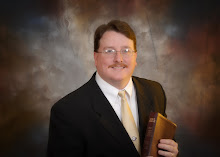As the pastor of a Church that is a cooperating member of the Tennessee Baptist Convention, I thought that I would give a report on the convention meeting that was held last week. Overall, it was a good meeting. The preaching was inspiring and the congregational worship that occurred throughout the meeting was excellent. There was very little controversy, but what little there was is worthy of note. Once again the point of contention centered upon the 2000 Baptist Faith and Message (http://www.sbc.net/bfm/bfm2000.asp).
Since the original 1925 edition was written, the Baptist Faith and Message has been for the purpose of explaining what Southern Baptists generally believe that Scripture teaches. Over the years, Southern Baptists saw it necessary to revise this basic statement of faith, in order to clarify what we believe Scripture to be saying. The latest edition, that was adopted during the year 2000 Southern Baptist Convention, reflects a far more conservative, literal interpretation of Scripture than its predecessors. Despite this fact, the 2000 Baptist Faith and Message (BF&M) once again came under attack during this year's Tennessee Baptist Convention meeting, but it came with an unexpected twist.
During one of the last business sessions, questions arose as to why there were people being put into offices within the convention who had openly said, "No" to the question of whether or not they affirm the 2000 BF&M. I was thankful that someone asked the question, because it bothered me as well. I want to know what our leadership believes about the Bible and asking them about the 2000 BF&M provides the answers that I need in that regard. The questionnaire that is filled out by each potential nominee should be for the purpose of providing as much information as possible for determining who is selected. The one who raised this concern said that he "would feel better if there was some doctrinal accountability." That is the whole reason for asking whether or not the nominee affirms the 2000 BF&M, because we should want to know what they believe the Bible says and not just simply whether or not they believe the Bible! Apparently that doesn't matter in the current selection process, as illustrated by Earl Wilson, chairman of the Committee on Boards, who said that "...whatever answer they gave did not disqualify them from service." In other words, it does not matter what they believe if they are willing to serve, but I doubt that most Tennessee Baptists would agree with that statement.
It was at this point that the attack on the 2000 BF&M occurred from a new angle than I had heard before. When the concern was raised over the questionnaire answers, another messenger took the occasion to attack the one who raised the concern as well as the 2000 BF&M, saying that it is "too liberal" for him to support. He illustrated this statement, saying that, in comparison with the 1963 BF&M, the 2000 BF&M "...leaves out that Jesus Christ is the criteria by which we interpret Scripture." That statement is only partially correct. In reality, the 1963 BF&M says, "The criterion by which the Bible is to be interpreted is Jesus Christ." Instead of leaving this statement out, as was said from the floor of the convention, the 2000 BF&M clarifies the meaning of that statement, by changing it to say, "All Scripture is a testimony to Christ, who is Himself the focus of divine revelation." This man neglected to mention the much more theologically conservative change that was made concerning Scripture between the 1963 and 2000 editions. For example, the 1963 BF&M says, "The Holy Bible was written by men divinely inspired and is the record of God's revelation of Himself to man." This statement was changed in the 2000 BF&M to say, "The Holy Bible was written by men divinely inspired and is God's revelation of Himself to man." On the surface, the change appears to be insignificant, but by saying that the Bible "is God's revelation" rather than "the record of God's revelation," the 2000 BF&M is confronting the view that the Bible contains the Word of God rather than that it is entirely the Word of God. The 2000 BF&M also added a logical conclusion concerning Scripture, saying, "Therefore, all Scripture is totally true and trustworthy."
To say that the 2000 BF&M is "liberal" is to not understand what being theologically liberal is. To be liberal theologically is to deny and undermine the authority of the entire Bible by questioning the accuracy and truthfulness of some of the Bible. To be conservative theologically is to affirm and defend the authority of the entire Bible through believing in the accuracy and truthfulness of the entire Bible. Under close examination of both documents, the 1963 BF&M is clearly the more liberal document overall, no matter what someone rants from the floor of the convention about the 2000 BF&M. If someone has a problem with the 2000 BF&M it is usually because they are liberal theologically, whether they will admit it or not. That should matter to us all and should make a difference in who we select to lead us in this convention!
About Me

- Preacher Witt
- Once, I was a hypocrite and a doubter. Then God sought me out with the life-changing Truth of Jesus Christ. He changed my life and saved my soul from Hell! I'd like to tell you how.
The Witt Family

Jonathan, Beth, Caitlin, Kristen, & Sarah